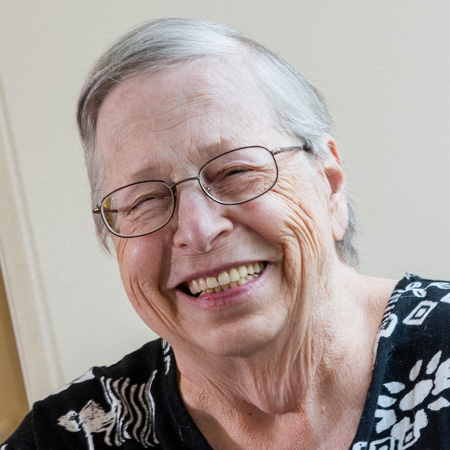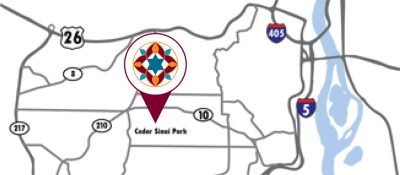If the walls at Rose Schnitzer Manor could talk, they might express surprise at a recent lecture in the May Living Room led by resident Marie Godfrey, Ph.D.
“Let’s start with our usual `Today in Genetics’ topic,” says Marie, cheerfully. “Today, it’s gene modification. You’ve probably heard the term GMO, or genetically modified organism. I’m talking about adding a vitamin D gene to a tomato. Perhaps we could replace the sun and vitamin pills with tasty tomatoes. As you know, part of my job is to introduce you to modern genetics and then explain why the idea is a waste of time and money.”
Marie’s rapt audience nods vigorously as she takes a breath.
This isn’t the sort of gathering you typically find at an independent and assisted living facility. But Marie is not a typical resident, nor is she a typical female of her generation.
She describes herself as one in a line of four strong women who take on whatever challenges are presented. Marie’s mother, daughter, and granddaughter are her stoic and resilient partners.
Marie St. Pierre was born in 1941 in Hartford, Connecticut, four days before Pearl Harbor; her brother was born “two years and eight months later on the same day of the month.”
She said her parents were “uneducated”—her mother was good at math but completed only the fifth grade to work on her foster parents’ farm—and her father ‘read a lot’ but mostly ‘junk Westerns.’”
The family was very poor, says Marie, living in a small house with no hot water and an oil stove for cooking. Some food was from unlabeled and dented cans gifted by the grocery store and produce about to be tossed. They also had a large garden.
As for school, “I was always told by my father, ‘Yeah, you got all A’s, but how often are you going to do that?’” says Marie. “It was always sort of a half compliment.”
Young Marie was quickly put into advanced classes, beginning with biology and chemistry. By the time she was in high school, her teachers recommended college. Unfortunately, tuition was $150 a semester and housing on campus was expensive.
“I begged and borrowed and all the rest of that kind of stuff to go to college and looked at a variety of schools, ending up at the Hartford branch of the University of Connecticut,” she said. “My father was dying of esophageal cancer at the time, so I needed to be near home.”
I wanted to do research. I told them, 'I don’t know what it is, but I’d like to do it!'
I tried to get on the Vanderbilt faculty and could not. It turned out women weren’t allowed to be faculty if their husbands were faculty.At Hopkins, Marie and a friend helped establish a graduate club. It’s still in operation more than 50 years later. Music and food attracted many male attendees, she said; Marie met her future husband, Andy Godfrey, there. While preparing for her thesis defense in microbial genetics, one of Marie’s reviewers asked her if she was planning to “get married and have children instead of working,” an allowable question back in the day. “Women were still a minority, an under-recognized group even at Hopkins,” Marie said, and then with her wry understatement added: “It was an interesting time.” After completing her doctoral degree, Marie did a one-year post-doc at Princeton University, working with a spore-forming microorganism. She and Andy were married in 1968 and moved to Nashville where Andy taught geology at Vanderbilt, and Marie accomplished a second post-doc year. “I tried to get on the Vanderbilt faculty and could not,” said Marie. “It turned out women weren’t allowed to be faculty if their husbands were faculty. I finally ended up getting a staff job helping teach a bacteriology laboratory for nurses and eventually replacing the instructor of a laboratory course in molecular biology.” Marie and Andy collaborated on a water contamination project in the Cumberland River that was published in the local paper. When someone else was tapped for the geology tenure position, they moved to Utah, where Andy worked for the U.S. Forest Service and Marie served as a volunteer educator for the American Cancer Society. This was the beginning of a 38-year life in Utah. “It was different,” said Marie, who had two daughters during this time. “There were no colleges nearby so there was no place I could teach. And I couldn’t teach in the local schools because I had a higher degree than other teachers or the principal. And, I wasn’t Mormon.” Marie spent a summer in southern Utah earning a secondary teaching certificate, and was later a substitute chemistry, and math, and English distance learning high school teacher. She taught night school at the local technology school and asked to teach advanced placement biology when she realized that the person instructing her daughter “had no idea what he was doing.” Later, she worked as the director of a women’s shelter, Girl Scout leader, and board secretary.On a trip to Portland for a triennial meeting, “I was introduced to Saturday Market,” said Marie. “I really liked the place and I found Portland safer than Salt Lake City.” Finally in a real city in Utah, she began writing for pharmaceutical companies and traveled frequently in the United States and Europe. In her job as medical writer and department director, she wrote clinical trial reports and summary documents for marketing applications for a variety of companies and drugs. Both of Marie’s daughters selected colleges in Oregon, married, and made homes in Portland. When Andy died in 2006 from a brain tumor, Marie bought a house here and finally made it back to Portland. Marie moved into Rose Schnitzer Manor in the fall of 2018 where cats Cricket and Panther were also welcomed. “There are a lot of activities here that people attend. People here are more likely to be educated than other places I investigated,” she said. “I didn’t know much about Judaism, so I studied the Torah for two years. As far as I’m concerned, religion is your own choice, and now that I know why certain traditions are done, I can understand them.” “I also learned that Jews love to argue,” said Marie, throwing her head back with a loud chuckle, “and that was good for me. The attitudes toward people and the variety of people here are much healthier than the other faiths that I’ve been near, and I like the fact that people are not judgmental.” Marie has found Covid and its virus fascinating to study and calls it the “smartest living un-living thing I’ve ever run across.” She challenges the misinformation about the Covid vaccines and includes information in her discussions with friends and those in the genetics class. In addition to teaching basic genetics to the Rose Schnitzer Manor residents, Marie is in the choir. She has been on the Resident Council. And in May 2022, she spoofed Cliff from the television show “Cheers” wearing a favorite t-shirt: “Never Underestimate a Woman with a Doctoral Degree.” “I love to talk,” she said. “I always say to new people, `I’m known as Marie who talks a lot.’ The first time I heard that, the other person finished by taking a breath. And then said, “but she’s really intelligent.” She appreciates that view.



